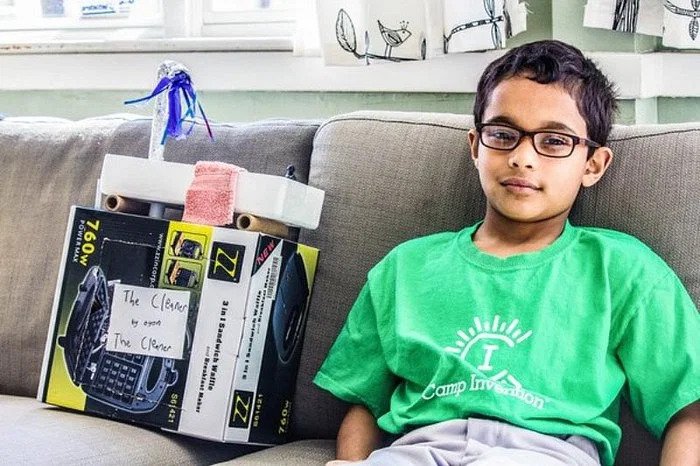(April 12, 2023) It was the viral ALS ice-bucket challenge – wherein participants dump buckets of cold water on each other’s heads – that made the then nine-year-old Oyon Ganguly come up with an idea of a water-recycling device as he was surprised by the terrible waste of water. 10-minute shower wastes 50 gallons of water – this piece of information was enough for this Indian American to come up with The Cleaner – a water recycling prototype that filters water to be re-used in the shower. The invention won this Massachusetts resident Invention Mighty Minds contest, a national-level contest run jointly by the National Inventors Hall of Fame (NIHF) which acts as America’s platform for budding young inventors.
“I asked my mom how much water is used in a single shower and I learned that around 50 gallons of water is used in a single use. Multiply that by five people taking 20-minute showers, that’s around 500 gallons,” he said in a YouTube video. This was enough for him to come up with a device that could recycle and reuse water that drains away during a shower. His invention was made inside a strawberry box that held three layers of cleaning material–gravel, sand, and charcoal.

Explaining how his invention works, the Global Indian said in an interview, “When someone takes a shower, the water goes down the drain and through the pipe before it reaches a filter with three layers: gravel, sand, and charcoal. The water, which is now clean and filtered, sits in a storage tank before it gets pumped back up to the bathtub. Because over time, the filter gets clogged, there will be a little door to make sure you get access to the filter.”
The grandson of Bengali novelist and Sahitya Akademi award-winner Sunil Gangopadhyay, Oyon took the help of his friend Mateo Rosado for the filtering process. Oyon reveals that his invention can save both water and money. “Even though the invention can be expensive, it saves the government from spending more money to get water and also reduced your water bill,” he explained in the video.
He credits his mother for making him participate in the Mighty Minds competition. “I went to Camp Invention in Watertown. We build things with recycled materials and my shower model was built mostly with recycled stuff. I spent an hour over two weekends putting together the presentation,” he said.
Oyon has worked on another invention idea – The Space Cleaner – a solar-powered robot with one arm that melts space junk and the other arm vacuums up the melted liquid. The idea for this came to him while watching Apollo 13 with his parents. The Indian American thought to himself, “What happens to everything that’s flying off the ship into space?”
He plans to be one of the three things when he grows up – an inventor, work at Lego, or for Mojang (the company that develops the video game Minecraft).
